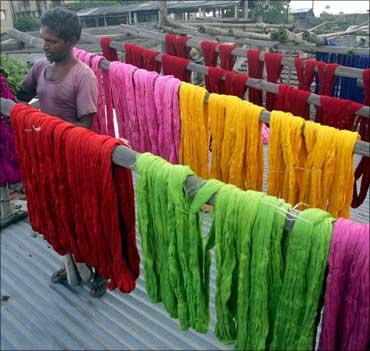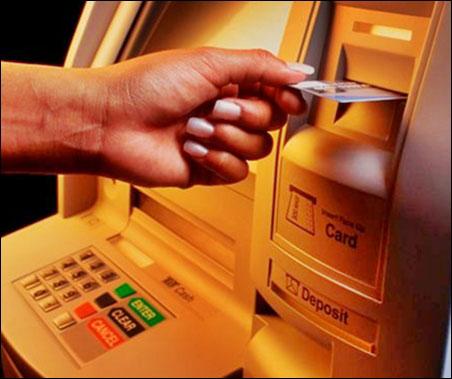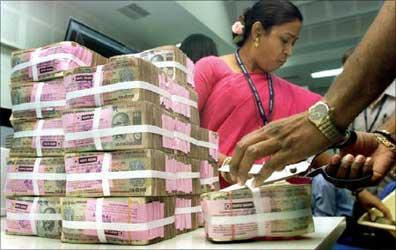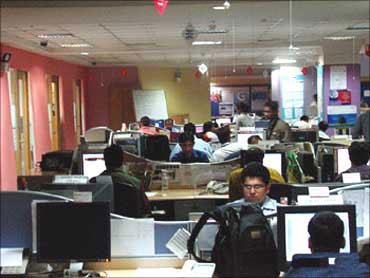Malini Bhupta & Sharleen D Souza in Mumbai
One man's meat, they say, is often another man's poison.
This adage best explains what the falling rupee is doing to corporate India.
While a weak rupee is a bane for most sectors, the country's two key export-oriented sectors -- IT and textiles -- are expected to gain from the phenomenon.
This month alone saw the rupee fall by 6.3 per cent: it was trading at Rs 49.27 at the start and is currently traded at Rs 52.41, courtesy global uncertainties in major economies.
Companies that earn revenues in dollars will see their realisations jump by a percentage points, thanks to this fall in the local currency.
. . .
Rupee fall: Textile, IT earnings to get a boost
However, the jump in earnings may not be equal to the fall in currency, as most companies protect their forex exposure by hedging their risk.
For long, the Reserve Bank of India has kept the country's real effective interest rate at 100 levels -- one that has kept Indian exports competitive in the world markets.
However, over time, this began rising, forcing some sort of a readjustment in the nominal exchange rates too.
While a depreciation of the local currency is good for export competitiveness, a lot of forex experts are not very happy about the volatility the Indian currency has witnessed compared to, say, a country like China.
. . .
Rupee fall: Textile, IT earnings to get a boost
For instance, even though the yuan has appreciated, it has happened at an almost predictable pace of 7-8 per cent since 2005.
This has allowed exporters from that east Asian country to readjust their costs.
However, Indian exporters do not enjoy this kind of stability.
For, the country's exchange rates are more market-driven and sensitive to a number of external and local factors.
Even so, the fall in rupee is definitely good news for IT services.
. . .
Rupee fall: Textile, IT earnings to get a boost
After all, they have seen a weaker growth and margin erosion over the last few quarters. If the second-quarter results are any indication, a fall in the local currency would improve margins of most tier-1 companies and earnings.
The rupee breaching 50 against the dollar, analysts say, will drive margins in the near term.
Abhishek Shindadkar, IT analyst at ICICI Direct, has upgraded his earnings per share forecast for Infosys to Rs 139-140 from the usual beat of Rs 137.
However, EPS projection for TCS remains the same as the company is sitting on close to $2 billion in hedges, claim analysts.
. . .
Rupee fall: Textile, IT earnings to get a boost
Some of the benefits of rupee appreciation are evident in the second-quarter earnings.
This gives a sense of what to expect over the next couple of quarters, as companies have visibility only that period.
In the second quarter, revenues in rupee terms for tier-1 companies grew 7.5 per cent sequentially, whereas the same in terms of dollar grew at 4.5 per cent, says financial service house Prabhudas Lilladher.
While the rupee appreciation means there clearly is an upside for IT services companies, continuous volatility in the current financial year will also push up costs for the companies.
. . .
Rupee fall: Textile, IT earnings to get a boost
For instance, Nirmal Bang has upgraded by 8-11 per cent its FY13 earnings forecast for all top-tier IT firms.
While FY12 estimates have also seen upgrades, EPS upgrades are lower than EBITDA upgrades.
Reason: likely forex losses on hedging in the wake of the rupee's weakness in 3QFY12, which could continue in 4QFY12.
It is this unpredictability of the currency movement that is capping the upside for companies.
Typically, companies that have exposure to foreign currency receivables hedge their risk by buying hedges.
. . .
Rupee fall: Textile, IT earnings to get a boost
Currency hedging are positions that companies take in the forex market to offset potential losses by fixing a band within which they expect the currency to move. If the currency moves out of that band then the benefit or loss is not theirs to bear.
At the start of the fiscal year, most companies had bought hedges expecting the rupee to remain in a band of 44-48.
These companies will probably not benefit too much from here on even if the rupee falls further.
For instance, 50 per cent of the current year's order book for most textile companies has been hedged.
. . .
Rupee fall: Textile, IT earnings to get a boost
Textile companies will be able to enjoy the benefit from the remaining 50 per cent of their order book.
Textile companies a year earlier had hedged their forex exporsure on the currency futures market at Rs 47-48 per dollar, little did they know that the rupee would fall as low as Rs 53 against the greenback.
Unfortunately, these exporters are stuck as they are locked in between March 2011 and June 2012.
The range of the amount that is hedged on the currency market varies from company to company, some have hedged as low as 20 per cent, while others have hedged till 80 per cent.
. . .
Rupee fall: Textile, IT earnings to get a boost
"We have hedged only 20 per cent of our total forex exposure," says R Sundaram, president finance & company secretary of Indo Count Industries, a manufacturer and exporter of cotton yarn and knitted fabrics.
"This will help us benefit from the ruling spot rate."
Nearly, 70 per cent of Indo Count's total revenue comes from exports.
Last year, the company earned Rs 550 crore (Rs 5.5 billion) from exports and Rs 185 crore (Rs 1.85 billion) from the domestic market.
. . .
Rupee fall: Textile, IT earnings to get a boost
The company is expecting the falling rupee to contribute another 5 per cent growth in revenues.
If the Indian rupee continues to remain weak in the coming fiscal, the earnings of the export oriented sector could do well.
However, volatility in the currency is not always good as it increases the risk too.
Companies need to manage their operations so as not to get hit by a larger impact in case of rupee reversal, say analysts.












article